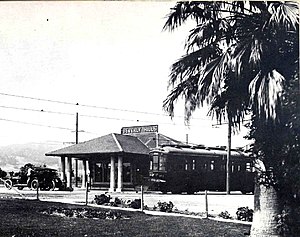Beverly Hills station
Beverly Hills | ||||||||||||||||||||||||
|---|---|---|---|---|---|---|---|---|---|---|---|---|---|---|---|---|---|---|---|---|---|---|---|---|
 The first Beverly Hills station, c. 1915–1920 | ||||||||||||||||||||||||
| Location | Santa Monica Boulevard Beverly Hills, California | |||||||||||||||||||||||
| Coordinates | 34°04′20″N 118°24′09″W / 34.072174°N 118.402449°WCoordinates: 34°04′20″N 118°24′09″W / 34.072174°N 118.402449°W | |||||||||||||||||||||||
| Tracks | 4 | |||||||||||||||||||||||
| History | ||||||||||||||||||||||||
| Opened | 1896 | |||||||||||||||||||||||
| Closed | 1954 (passenger) c. 1960 (freight) | |||||||||||||||||||||||
| Rebuilt | 1930 | |||||||||||||||||||||||
| Previous names | Morocco | |||||||||||||||||||||||
| Original company | Pasadena and Pacific | |||||||||||||||||||||||
| Former services | ||||||||||||||||||||||||
| ||||||||||||||||||||||||
| Location | ||||||||||||||||||||||||
 | ||||||||||||||||||||||||
Beverly Hills refers to two railway stations in Beverly Hills, California. With the first constructed in 1896, they came to be served by the Pacific Electric and Southern Pacific railroads until the 1960s. The first station was demolished and replaced with a second across the street.
History[]
First station[]
The first station was built in 1896 as a stop on the Pasadena and Pacific Railroad. Initially called Morocco,[1] it was located on the southeast corner of Santa Monica Boulevard and Canon Drive.[2] Pacific Electric acquired the station as a result of the Great Merger of 1911 and began operating Red Cars here. The site was sold with the station demolished in 1930 to allow for construction of the Beverly Hills Post Office (later the Wallis Annenberg Center for the Performing Arts).
Second station[]
A new station was built across Canon Street, on the southwest corner with Santa Monica Boulevard. The Spanish Baroque-style building was designed by Harry G. Koerner.[3] All passenger service ended by September 1954,[4] and the station building was removed in the 1960s.[2] The final Southern Pacific freight train left Beverly Hills in 1986.[1]
References[]
- ^ a b Schwieterman, Joseph P. (2004). When the Railroad Leaves Town: American Communities in the Age of Rail Line Abandonment, Western United States. Kirksville, Missouri: Truman State University Press. pp. 28, 30, 31. ISBN 978-1-931112-13-0.
- ^ a b Wanamaker, Marc (2005). Early Beverly Hills. Arcadia Publishing. pp. 22, 120. ISBN 9780738530680.
- ^ "Architect Succumbs. H. G. Koerner Meets End Fourteen Hours After Testimonial Dinner". The Los Angeles Times. February 28, 1935. p. 28. Retrieved June 8, 2019 – via Newspapers.com.

- ^ Veysey, Laurence R. (June 1958). A History Of The Rail Passenger Service Operated By The Pacific Electric Railway Company Since 1911 And By Its Successors Since 1953 (PDF). LACMTA (Report). Los Angeles, California: Interurbans. p. 22. ASIN B0007F8D84.
External links[]
- Pacific Electric stations
- Railway stations in Los Angeles County, California
- Railway stations in the United States opened in 1896
- 1996 establishments in California
- Railway stations in the United States opened in 1930
- Buildings and structures in Beverly Hills, California
- Demolished railway stations in the United States
- California railway station stubs
- Los Angeles County, California geography stubs

